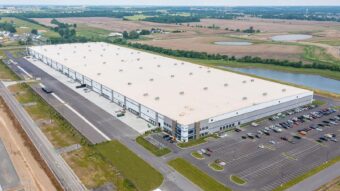Drug makers and other major life sciences companies are working with savvy CRE professionals to bring new life sciences incubator spaces into the market in hopes of fostering the next new innovation. As startups continue to drive life sciences innovation at a startling pace, there are new opportunities on the horizon for both Big Pharma and enterprising real estate developers.
Early-stage ventures drive a large cross-section of new medicines, according to JLL’s seventh annual Life Sciences Outlook. Nearly two-thirds of medicines approved since 2013 originated from small companies, with midsize and smaller biopharma companies receiving a record 23 new drug approvals just last year.
“Big Pharma is entering new territory as major players question whether incubator labs represent a threat or opportunity as the primary generator of new products,” said Roger Humphrey, executive managing director and leader of JLL’s life sciences group. “This new market dynamic presents a unique opportunity for traditional industry players. By casting a wide net of investment in a broad portfolio of young ventures, a big biopharmaceutical company can leverage outside scientific talent and gain access to breakthrough discoveries in their strategic areas of interest.”
With a 6.5 percent annual growth, the worldwide prescription drug market is expected to reach $1.06 trillion by 2022, compelling many biopharma companies to create their own venture capital funds, partner with startups or license technology to fuel their own drug pipelines. Many are also outsourcing R&D while reducing their in-house product development efforts.
Focus on Chicago
Chicago has been ranked on Genetic Engineering and Biotechnology News’ list of Top 10 U.S. Biopharma Clusters for three years in a row. The biopharmaceutical industry in Chicago is an immediate market for medical device manufacturers. Chicago has six world-renowned schools of medicine; JLL’s ranking places the market seventh nationally for annual life sciences Ph.D. graduates with 546. The market has the largest concentration of physicians, two major federal research labs and over 30 teaching hospitals that drive its competency in the biopharmaceutical industry.
Dominating the Chicago metro’s life sciences industry are large, publicly traded multinationals, such as Baxter International, Abbott Laboratories and Horizon Pharma, as well as the federal government, which maintains a significant footprint with two research sites, Argonne National Laboratory in Woodridge and Fermi National Accelerator Laboratory in Batavia. In addition, Chicago hosts a number of world-renowned academic institutions contributing to scientific research and benefits from the 23-acre Illinois Science & Tech Park in Skokie that focuses on emerging biosciences.
Chicago provides excellent testing grounds for innovative medical research through its number of hospitals including Rush University Medical Center, University of Chicago Medical Center and Northwestern Memorial Hospital. The majority of these users own their Chicago facilities, clustering within suburban campuses, and therefore minimally impacting the local leasing market. Specifically, Chicago’s north shore submarkets in Cook County and Lake County are home to R&D-heavy firms.
Lake County continues to drive Chicago’s life sciences cluster with more than 100 biotechnology/pharmaceutical companies, including 10 corporate headquarters. Employees at these biopharmaceutical firms earn nearly 50 percent more than the overall average wage in Lake County.
Companies in the life sciences sector are attracted to Chicago’s high-quality universities and extensive transportation network. Funding from venture capital and the National Institutes of Health has not showed any signs of slowing down; NIH funding has increased by 3.0 percent year-over-year. Chicago benefits from a highly skilled workforce from some of the country’s top universities. This educated workforce has pushed growth in life sciences employment, up 1.1 percent year-over-year. In metro Chicago, 14.4 percent of adults aged 25 years or older have a graduate degree. In Lake County, that figure is 18.3 percent.
Chicago’s life sciences companies employ 52,668 workers, with more than $998 million in funding, from VC and NIH sources combined. The total supply of life sciences real estate space is 8.8 million square feet, with a 3.4 percent vacancy. The average, triple net lease asking rents are $14.05 per square foot. More than half of this occupied space is dedicated to the manufacture of medicine or medical equipment/supplies.
Incubator labs: A new ecosystem
Real estate costs are at all-time highs with availability at all-time lows, impelling life sciences companies and real estate owners/investors to find new ways to engage with the new ventures. Life sciences incubators are popping up across the United States as a critical part of the medical research and production system.
For young companies looking to grow in the top life sciences clusters, incubators are filling a critical gap. Part investment fund, part accelerator, incubators nurture the growth of early-stage life sciences companies by providing turnkey laboratory and office space, entrepreneurial support, strategic programming and access to capital.
The Illinois Science + Technology Park is currently undergoing a redevelopment that will add up to 2 million square feet of office and state-of-the-art facilities, creating a full-service corporate research campus with the capability to meet the needs of growing, early stage companies as well as large and established life sciences firms.
Tenants at the Illinois Science + Technology Park include Charles River, a drug research and development firm; Fresenius Kabi, a fully integrated pharmaceutical company and Vetter Pharma, an international contract development and manufacturing organization specializing in the aseptic filling of syringes, cartridges and vials. The facility also hosts a business incubator dedicated to supporting the growth of very early stage technology and science-based businesses, fostering collaboration and sharing among young companies, while respecting the independence and self-reliance that motivates entrepreneurs.



